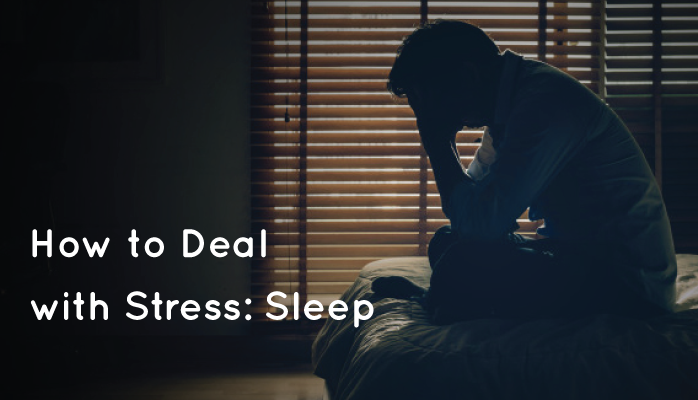With a year that has been so challenging, it's very easy for stress to add up. When stress compounds it can disrupt many areas of life, especially sleep. Managing sleep patterns well can relieve some of the burden of stress and help keep you going during questionable times.
Why is Sleep Important?
Sleep is an integral bodily process that is necessary for a healthy and balanced life. It is the time where the body and mind repair, rest, and recuperate. It is not fully understood, but what is known about it, is that it is extremely important for normal bodily and mental functioning. Without proper sleep, there can be side effects ranging from minor to severe.
One of the most often overlooked factors for improving overall sleep quality is the body’s primary stress hormone: cortisol. Cortisol is an internal chemical signal that is released as a response to external or internal stressors. For a healthy individual, cortisol levels should be at their peak in the morning, and should be at their lowest in the late evening.
When stress begins to disrupt sleep, cortisol regulation can become inverted. This is that feeling of “I’m exhausted but I can’t fall asleep”. In other words, not good.
Side Effects of Sleep Deprivation
Sleep deprivation can include one or more of the following side effects:
- Less able to manage stress and anxiety
- Lower life expectancy
- Underperform at work, school, etc.
- Chronic irritability that can interfere with relationships
- Less engagement in activities
- More brain fog and general apathy
- Lower quality of life
- Lower sex drive
- Lower ability to deal with stress
- Lower pain threshold (makes pain worse)
From sleep disturbance to… Sleep Debt
Another important consideration for continued sleep disturbance is called “sleep debt”. Sleep debt is like a financial debt: your balance is in the negative, or you “owe” hours of sleep because you have slept less than what is required. Over time, a “sleep debt” forms so you need to get extra sleep and “pay back” your debt. In other words:
- Your body requires a certain about of sleep, which is different depending on your age
- As you get less sleep than required, you become sleep deprived
- This sleep deprivation causes a “debt” which you have to “pay” by sleeping more than the required amount
For example, if you should be sleeping 7 hours per night, and the last three nights you have slept 6 hours each night, then your “sleep debt” would be 3 hours. It’s important to understand sleep debts because they are more complex and nuanced than the above bullet points.
Even the term “sleep debt” is a bit misleading because you can’t “repay” a sleep debt like you repay a loan. Essentially, you can’t just get a bunch of sleep one night and repay your sleep debt. It doesn’t work this way.
Binge Sleeping Doesn't Work
Although it may be nice to get some extra sleep on the weekends or days off, it is important to know that it is not a sustainable long-term solution for sleep debt.
One of the problems with the term “sleep debt” is that it’s not a debt that you can simply repay in one lump sum, such as by binge sleeping for, say, 12 hours. Sleep studies show that getting one or two long nights of sleep does not remove the effects of sleep deprivation.
Here’s a common scenario.
- During the week you get less than the required amount of sleep
- You stay up late watching Game of Thrones or Seinfeld, and only get 4 hours of sleep
- You’re not worried – you can “make up” this sleep on the weekend
- Then on the weekend, you sleep until noon on Saturday
Sleep deprivation is not so easily resolved by this behavior. Rather, a long-term solution is to modify sleep routine so it supports a healthy amount of sleep on a regular basis.
Also, binging on sleep can continue the pattern of disruption. By sleeping in until noon, you may have actually set yourself up for another night of poor sleep, and potential difficulty falling asleep at your normal time.
A much better solution is to consider the problem holistically, and make small adjustments to your overall daily routine, so it is supportive of regular and adequate sleep hours.
Overcoming Sleep Debt

The actual way you repay your sleep debt is by establishing a healthy pattern of sleep over time. For example, if you have a week of under sleeping, the correct way to repay your debt is to:
- Get a little extra sleep on the weekend (say, around 9 hours each night) without oversleeping
- Get enough or a little bit of extra sleep every day the following week
Repaying sleep debt involves consistent, restful sleep until the effects of sleep deprivation are gone.
An easy way to begin working out of sleep debt is to set a goal to increase your sleep by 5-10 minutes each night, until you reach the adequate time for nightly sleep. For example, if you need to sleep 8 hours, and you currently only get 7 hours, you can try to add 5-10 minutes each night until you have the full 8 hours per night.
That way, you are making gradual changes. This is helpful for establishing a new routine and making it a habit, while also avoiding the binge/debt trap by oversleeping due to fatigue.
Tips for De-stressing to support better sleep:
Mindfulness Exercises
Mindfulness exercises can be an easy way to begin unwinding some of the stress that is impacting your sleep. There are tons of programs, apps, videos, books, and songs to try in this field. Meditation, mindfulness, quiet-time. Whatever you want to call it, the point is this: take a little time to close your eyes, take 3-5 deep breaths, and just relax the mind. Taking a little time to relax the mind and focus on your breathing helps the body down-regulate the stress response and enter into “parasympathetic nervous system arousal”, which is a fancy way of saying, “relaxed, calm, restful” mode.
Take a cold shower
Or maybe a cool shower would be more suited to your style. Either way, getting your body temperature down prior to sleep can help you fall asleep faster and encourage your body to relax into your bed. Also, this can help regulate cortisol levels by giving your body a sympathetic nervous system wake-up call, which can help create a “set-point” for what should be stressful, versus what “appears” to be stressful.
Put the Phone Down!
First off, give the news a break occasionally. And social media. And browsing the internet. Yes that includes cat videos. The blue light from phones works to “wake-up” the sympathetic nervous system, which can be problematic for falling and staying asleep.
WATER.
Drinking water is very important. Keep a glass of next to your bed because many bodily processes, including how the body deals with stress, require adequate water. If you want to decrease stress on the body, drinking water can be an easy win.
Little by little, these kind of changes can support a healthier balance between dealing with the stresses of our time, while also getting quality restorative sleep!


